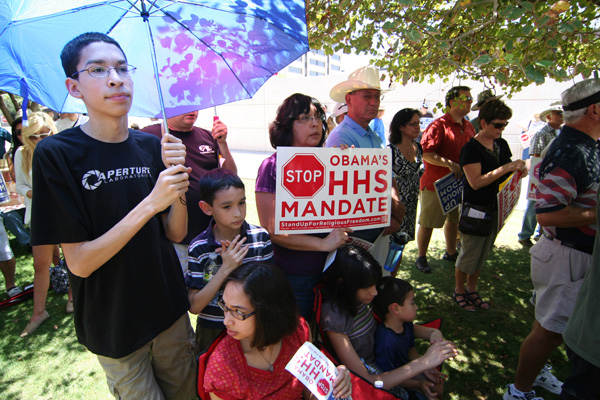
INDIANAPOLIS (CNS) — The fight over the federal contraceptive mandate is not about artificial birth control or a theological or moral debate about contraceptives,” but is about an “unprecedented violation of religious freedom” by the government, a law professor said June 21.
Everyone “should be concerned about this policy,” regardless of their view of contraceptives or their opinion of the religious and other groups fighting the mandate, said Carter Snead.
He was one of three speakers on a panel at the annual Catholic Media Conference, held June 20-22 in Indianapolis. He teaches law at the University of Notre Dame and is director of school’s Center for Ethics and Culture.
Snead was joined by Rita Joyce, a civil and canon lawyer who is general counsel for the Pittsburgh Diocese and president of the Canon Law Society of America, and Michael Scaperlanda, associate dean for academics at the University of Oklahoma College of Law.
Snead provided an overview of the mandate and the narrow religious exemption to it and how both were drafted. He also took on critics who claim the U.S. bishops’ opposition to the mandate is driven by politics.
Issued by the Department of Health and Human Services, the federal mandate requires most religious employers to provide insurance coverage of contraception, sterilization and abortifacients free of charge to their employees.
To be exempt, a religious organization must have “the inculcation of religious values as its purpose”; primarily employ “persons who share its religious tenets”; primarily serve “persons who share its religious tenets”; and be a nonprofit organization under specific sections of the Internal Revenue Code.
Scaperlanda gave a historical perspective on religious liberty as well as other contemporary examples of government infringement on religious liberty. He noted that over the centuries, “God is and has always been a problem” for governments. “Power hates a rival,” he added.
Joyce talked about the lawsuits filed May 21 by 43 Catholic entities in 12 federal district courts, as well as those filed separately by other organizations and concerned individual employers. As of mid-June, 56 entities are plaintiffs in 23 individual lawsuits, she said. Joyce also explained the road ahead is a long one for the lawsuits, noting various deadlines for both plaintiffs and the courts in the different jurisdictions.
“We will never even get to the heart of our filing for many months down the road,” she noted.
In his remarks, Snead took issue with critics of the bishops’ response to the mandate and as well as with those who say there was “a rush” to file lawsuits.
The Patient Protection and Affordable Care Act was passed by Congress in early 2010, and President Barack Obama signed it into in law in March 2010.
On Aug. 1, 2011, HHS Secretary Kathleen Sebelius outlined the mandate and the narrow, four-pronged religious exemption to the contraceptive mandate.
In January of this year in “the face of a great deal of uproar” from Catholics “on the left, right and center,” Snead said, Sebelius announced the Obama administration was not going to change its mind on the mandate “and that the best we could hope for was a one-year safe harbor during which you could figure out how you’re going to comply.”
The Catholic bishops and other religious leaders “took quite a long time to negotiate with the administration,” filed comments and tried to persuade federal officials to reject the mandate all together or at the very least broaden the exemption.
“Finally the last thing they could do was to bring suit,” Snead said.
He added, “It’s certainly not a partisan gambit on the part of ‘right wing’ bishops to try to upset the president. … It’s worth reminding ourselves and others the bishops have been for universal health care since 1919.”
He said that when Obama recently announced his executive action to stop deportations of young people in this U.S. illegally, the U.S. bishops supported the move, which “puts a lie to the fact the bishops are simply an arm of the Republican Party.”
Snead noted that in March of this year, the Obama administration announced what it called an “accommodation” by offering suggestions for ways religious employers could provide the mandated services without having to pay for them directly — by using a third-party payer.
But Snead said the “‘accommodation’ is a promise to try to find some form of accommodation by August 2013. … That’s significantly after the presidential election.”
“It would be quite a feat for a tool of the Republican Party to try to engineer an unprecedented imposition of religious coercion on religious institutions … just so they could bring a lawsuit in the months preceding an election,” he continued. “Those assessments are flawed.”
Anyone concerned about providing the material needs of the poor and low-income people and them having access to health care should be concerned about the mandate, because it is “making harder for those people to get services,” Snead said.
The Catholic Church’s religious mission “requires us to reach out to everyone regardless of what they believe and render assistance and care to them because they are our brothers and sisters,” he added.
Contributing to this story were Sean Gallagher and Julie Asher.






